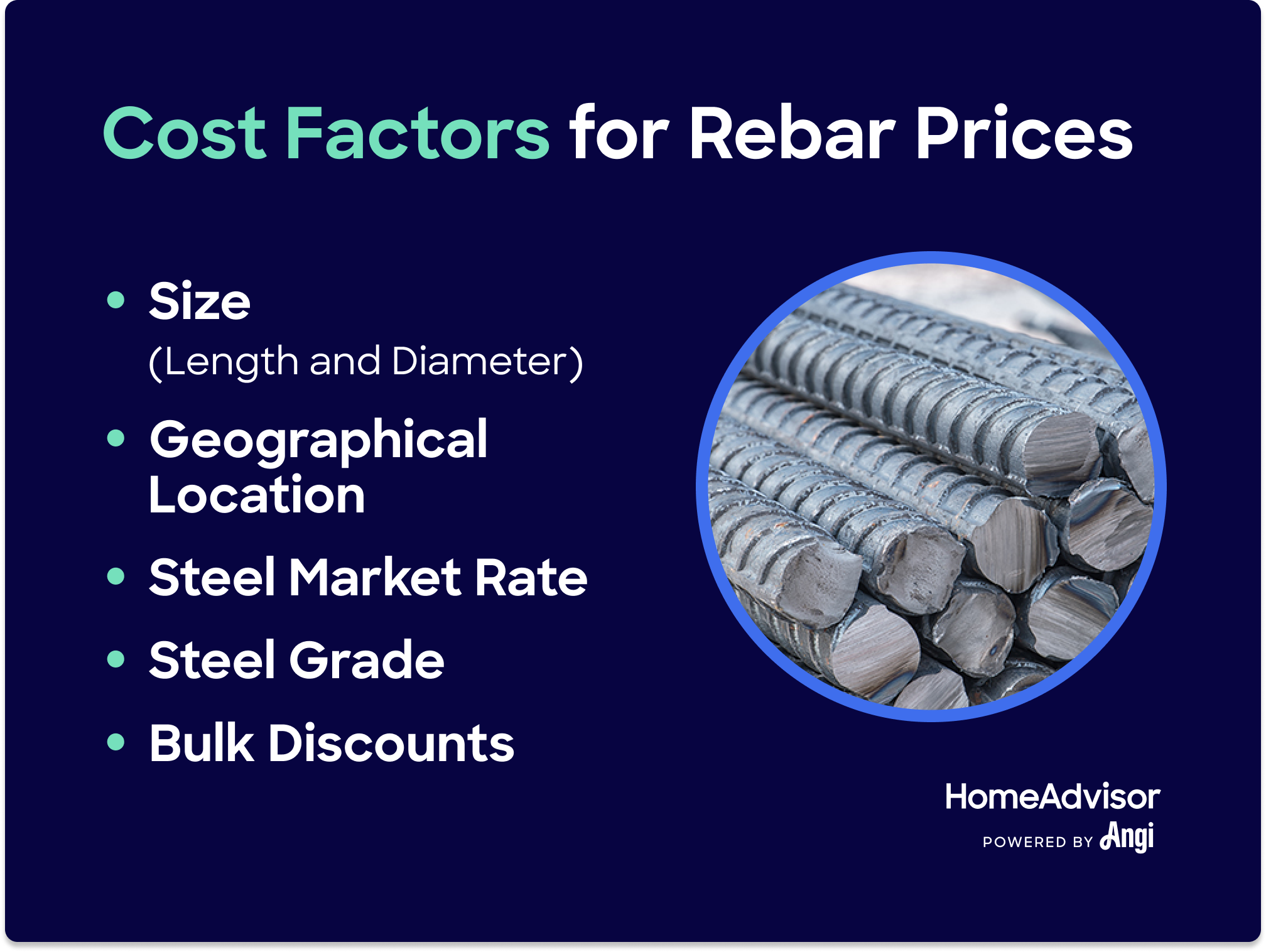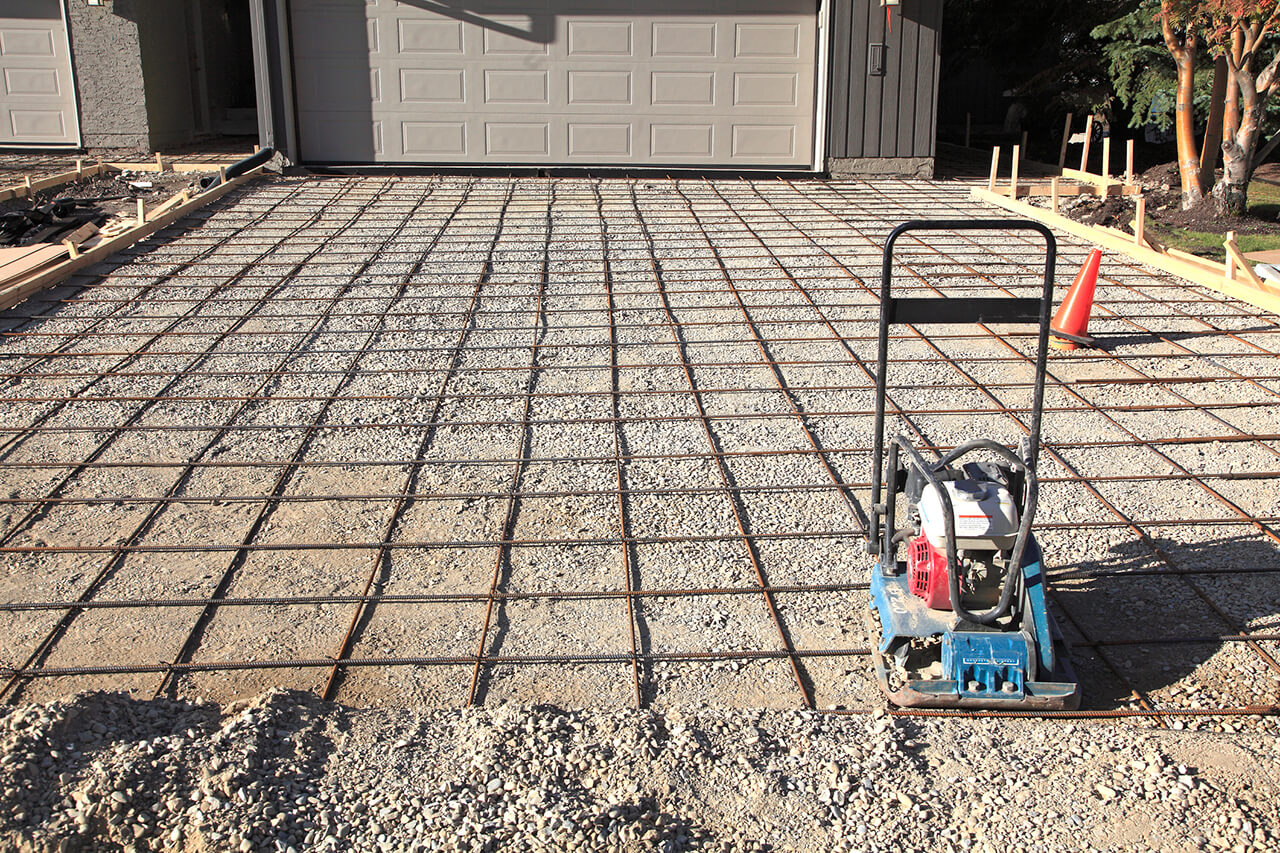What Are Standard Residential Rebar Prices?
Typical Range:
$400 - $800
Typical Range:
$400 - $800
Cost data is based on research by HomeAdvisor.
Updated November 1, 2022
Written by HomeAdvisor.Rebar prices range from $400 to $800 depending on the quantity and type you purchase for a concrete project. On average, rebar costs from $0.70 to $0.80 per linear foot, not including installation costs. Common rebar sizes for residential projects are #4, which costs from $0.30 to $2.00 per linear foot, and #5, which costs from $0.45 to $2.55 per linear foot.
Rebar, short for reinforcing bar, is (most commonly) a steel bar placed inside concrete for added strength and stability. Steel prices can fluctuate sporadically, so your overall project cost could rise or fall depending on economic conditions. Check with a local rebar supplier for the current market prices. Unless you're doing a DIY project, your contractor includes rebar prices in other concrete project costs.
Depending on rebar length and diameter, you'll pay $0.18 to $6.20 per linear foot, not including installation. Most hardware stores identify rebar by diameter, while some use industry sizing.
| Standard Bar Size (Millimeter) | Diameter (Inches) | Cost per linear Foot |
|---|---|---|
| #3 (10) | 3/8" | $0.18 – $1.25 |
| #4 (13) | 1/2" | $0.30 – $2.00 |
| #5 (16) | 5/8" | $0.45 – $2.55 |
| #6 (19) | 3/4" | $0.75 – $3.70 |
| #7 (22) | 7/8" | $1.30 – $5.05 |
| #8 (25) | 1" | $3.25 – $6.20 |
Grade 40 or 60 #3 rebar costs $0.18 to $1.25 per linear foot. At, 3/8 inches in diameter, it's the smallest size rebar you can find. This type is typically used in low or non-load-bearing applications, such as a patio or driveway.
| Grade 40 and 60 Size #3 Rebar | Cost Ranges |
|---|---|
| Cost per foot | $0.18 – $1.25 |
| Cost per pound | $0.47 – $3.29 |
| Cost per ton | $950 – $2,200 |
Grade 40 or 60 #4 rebar costs $0.30 to $2.00 per linear foot. Pros use this 1/2-inch diameter, mid-sized rebar for driveways, foundation floors, and walls.
| Grade 40 and 60 Size #4 Rebar | Cost Ranges |
|---|---|
| Cost per foot | $0.30 – $2.00 |
| Cost per pound | $0.45 – $2.98 |
| Cost per ton | $900 – $2,300 |
Grade 40 or 60 #5 rebar costs $0.45 to $2.55 per linear foot. It's generally the largest size used in residential construction at 5/8 inches in diameter, usually for foundation-grade beams, foundations, and footings.
| Grade 40 and 60 Size #5 Rebar | Cost Ranges |
|---|---|
| Cost per foot | $0.45 – $2.55 |
| Cost per pound | $0.43 – $2.45 |
| Cost per ton | $850 – $2,500 |
New. Explain that these larger sizes typically aren’t used for residential work and give a broad overview of prices and applications.
Rebar sizes #6 and larger are typically not used in residential construction. The heavier gauge bar is better suited for commercial and industrial applications. #6 through #8 bars are used for medium to heavy applications like retaining walls, high-rise construction, and parking structures.
Rebar is made from various types of material. Depending on the installation location, your concrete pro may recommend a material other than basic steel rebar.
| Rebar Type | Cost Range | Characteristics |
|---|---|---|
| Steel | $0.18 – $6.80 per linear foot | Basic untreated steel. Weldable. |
| Stainless steel type 304 or 316 | $2.50 – $16 per linear foot | Impervious to corrosion and provide a maintenance-free application. |
| Galvanized | +10% – 15% over untreated steel | The galvanization process provides an exterior coating of zinc to combat long-term corrosion. |
| Epoxy coating | $300 – $400 per 50 lb. box. | Epoxy-coated rebar costs 10 cents per pound more than uncoated steel (known as black rebar). Most pros favor using galvanized or stainless steel over epoxy coated due to its chloride issues. |
| Fiberglass | Cost varies by location and supplier | Glass Fiber Reinforced Polymer Rebar (GFRP). These fiberglass rods provide a lightweight, corrosion-resistant alternative to steel. They have similar or better tensile strengths. |
Rebar stirrups hold longitudinal rebar sections together. Depending on the sizing, each rebar stirrup costs $5 to $20 or more. Stirrups are square or rectangular in shape and range from six to 36 inches, sometimes even larger.
You'll spend anywhere from $850 to $2,500 per ton when purchasing bulk rebar. You would not need to purchase this much rebar for most residential applications. Contractors or wholesalers typically use rebar pricing by the ton.
| Size | Cost per Ton |
|---|---|
| #3 | $950 – $2,200 |
| #4 | $900 – $2,300 |
| #5 | $850 – $2,500 |
In addition to rebar sizing and material type, the following factors also influence the price:
Geographical location: Often, rebar will be more expensive in remote locations where less stock is available.
Steel market rate: The price of steel can fluctuate greatly depending on market conditions. If manufacturing or supply chain issues exist, you can usually expect the cost of steel rebar to increase substantially.
Bulk discounts: Generally speaking, buying 20 feet of rebar is less per foot than a tow-foot bar. Plus, concrete contractors may receive a discount from suppliers for bulk rebar purchases. If your project is large enough, those connections could pass down some of the savings to you.
Grade: Grade is a measure of the strength of a piece of rebar. Typically, the higher the grade, the higher the cost.
Size purchased: As the size of the steel rebar you purchase increases, so will the price. The size considers both the length of the rebar and the diameter.
Most residential projects use #3, #4, or #5 rebar of grade 40 or 60. Grade classifies the strength of the rebar or how many pounds per square inch the rebar can withstand. Manufacturers measure grade by “ksi" or kilopound per square inch.
There are two separate rebar grade ratings: yield and tensile. If a piece of rebar is pulled on each end, yield strength is determined when the rebar starts to deform and can’t return to its original shape, and tensile strength is determined when the rebar fails or breaks.
Rebar grade ratings
| Rebar Type | Minimum Yield Strength | Minimum Tensile Strength |
|---|---|---|
| Grade 40 | 40 ksi | 60 ksi |
| Grade 60 | 60 ksi | 90 ksi |
Rebar installation requires proper knowledge of concrete and specialty tools that can cut bend and tie it. Plus, you’ll need to know how to read engineering plans. Improperly installing rebar can pose a safety risk and cause your concrete to crack, sag, or collapse over time.
For this reason, rebar installation is typically best left to the pros. Save yourself the headache by hiring a local concrete foundation installer or concrete floor installer near you to ensure the job is done right.
Steel reinforcing bars, commonly known as rebar, are installed inside concrete to increase the concrete’s strength and stability. Common residential rebar applications include:
Driveways & Patios: 3/8 inch diameter (#3) rebar is used for concrete slabs such as driveways and patios.
Walls & Columns: For walls, columns, and piers, 1/2 inch diameter (#4) rebar or greater is used.
Foundations: Building foundations require at least 1/2 inch diameter (#4) rebar, but 5/8 diameter (#5) rebar is more commonly used.
The number of pieces of rebar in a bundle ranges from six to 50 pieces or more. A bundle of rebar is not a standard unit of measurement; therefore, the exact amount depends on the specific supplier and rebar sizing.
Calculating how much rebar you need is best done by a structural engineer. Each project has specific structural requirements. A structural engineer or trained concrete contractor will ensure your concrete project budgets for the right about of rebar as well as the proper sizing and placement.

